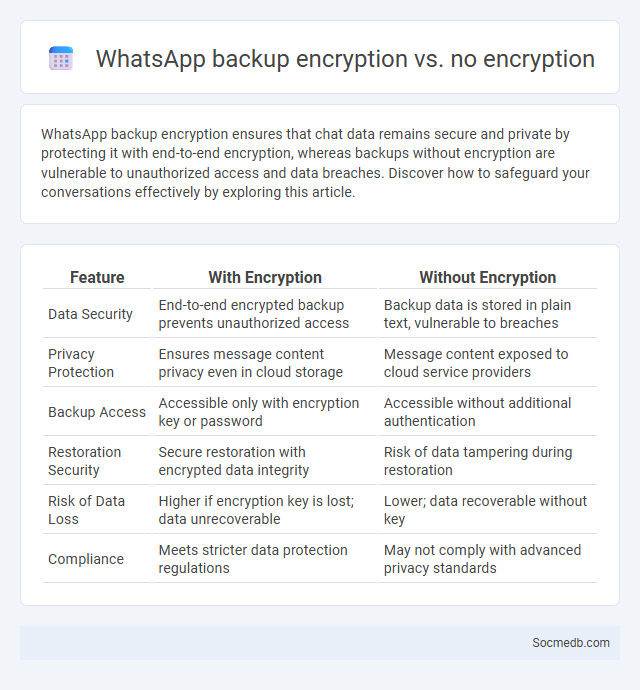
Photo illustration: WhatsApp backup encryption vs no encryption
WhatsApp backup encryption ensures that chat data remains secure and private by protecting it with end-to-end encryption, whereas backups without encryption are vulnerable to unauthorized access and data breaches. Discover how to safeguard your conversations effectively by exploring this article.
Table of Comparison
| Feature | With Encryption | Without Encryption |
|---|---|---|
| Data Security | End-to-end encrypted backup prevents unauthorized access | Backup data is stored in plain text, vulnerable to breaches |
| Privacy Protection | Ensures message content privacy even in cloud storage | Message content exposed to cloud service providers |
| Backup Access | Accessible only with encryption key or password | Accessible without additional authentication |
| Restoration Security | Secure restoration with encrypted data integrity | Risk of data tampering during restoration |
| Risk of Data Loss | Higher if encryption key is lost; data unrecoverable | Lower; data recoverable without key |
| Compliance | Meets stricter data protection regulations | May not comply with advanced privacy standards |
Introduction to WhatsApp Backup Options
WhatsApp offers several backup options to secure your chat history and media files, including local device backups and cloud-based solutions like Google Drive for Android and iCloud for iOS. You can customize backup frequency to daily, weekly, or monthly intervals, ensuring your data is regularly saved without manual effort. Properly managing your WhatsApp backup settings protects your conversations and enables seamless data restoration if you switch devices or reinstall the app.
Understanding WhatsApp Backup Encryption
WhatsApp backup encryption secures your chat history by converting messages into an unreadable format before storing them on cloud services like Google Drive or iCloud. This end-to-end encryption ensures only you and authorized devices can access the backup content, preventing unauthorized access even if cloud storage is compromised. Understanding this process helps you protect your personal data and maintain privacy across your social interactions on WhatsApp.
How Encrypted Backups Work on WhatsApp
Encrypted backups on WhatsApp protect your chat history by using end-to-end encryption, ensuring that only you have access to your stored messages. These backups are secured with a unique encryption key or a password, which WhatsApp does not store or have access to, making it impossible for anyone else, including WhatsApp, to decrypt your data. Managing this encryption key carefully is crucial because losing it means losing access to your backed-up conversations permanently.
Risks of Using Unencrypted WhatsApp Backups
Unencrypted WhatsApp backups pose significant privacy risks by exposing users' chat histories, media files, and sensitive information to potential unauthorized access or cyberattacks. These backups, stored on cloud services like Google Drive or iCloud without encryption, can be vulnerable to data breaches and hacking attempts. Maintaining encrypted backups is crucial to protect personal conversations and prevent misuse by malicious actors.
Comparing Encrypted vs. Unencrypted WhatsApp Backups
Encrypted WhatsApp backups provide enhanced security by using end-to-end encryption, ensuring your messages and media remain private and inaccessible even if the backup storage is compromised. Unencrypted backups, stored on cloud services without encryption, expose your data to potential breaches, putting your personal conversations at risk. Prioritize encrypted backups to safeguard your sensitive information and maintain your privacy on social media platforms.
Chat Backup Features and Storage Locations
Chat backup features securely save your conversations, ensuring that your messages are not lost during device changes or app reinstallations. Your chat data can be stored locally on your device, in cloud storage services like Google Drive or iCloud, or encrypted backups maintained by the social media platform itself. Understanding where your backups are stored helps you control data privacy and manage storage space effectively.
Data Privacy Implications of Backup Choices
Selecting appropriate backup options on social media platforms directly impacts the security and privacy of user data, influencing potential exposure to unauthorized access or breaches. End-to-end encrypted backups offer enhanced protection compared to standard cloud backups, which may be vulnerable to hacking or server vulnerabilities. Users must evaluate platform policies and encryption standards to safeguard personal information effectively during data storage and recovery processes.
Steps to Enable WhatsApp Backup Encryption
WhatsApp backup encryption safeguards your messages by protecting data on Google Drive or iCloud with a unique encryption key. To enable this feature, open WhatsApp Settings, navigate to Chats, select Chat Backup, and tap End-to-end Encrypted Backup before creating a secure password or a 64-digit encryption key. Ensure you keep this key safe, as losing it means you cannot restore your encrypted backups.
Limits and Drawbacks of Encrypted WhatsApp Backups
Encrypted WhatsApp backups enhance privacy by securing message data, but they also introduce limitations such as the inability to recover chats if users forget their encryption password or key, potentially causing permanent data loss. Furthermore, encrypted backups are incompatible with cross-platform transfer tools and cloud services lacking end-to-end encryption, restricting seamless data migration between devices. These drawbacks raise concerns about user accessibility, data recovery options, and overall convenience despite robust security benefits.
Best Practices for Secure WhatsApp Chat Backups
Ensuring secure WhatsApp chat backups involves enabling end-to-end encryption for your backup files, which protects your message history from unauthorized access. You must regularly update your app and use strong, unique passwords for linked cloud storage accounts like Google Drive or iCloud. Your security also depends on verifying your two-factor authentication settings and limiting backup access to trusted devices only.
 socmedb.com
socmedb.com